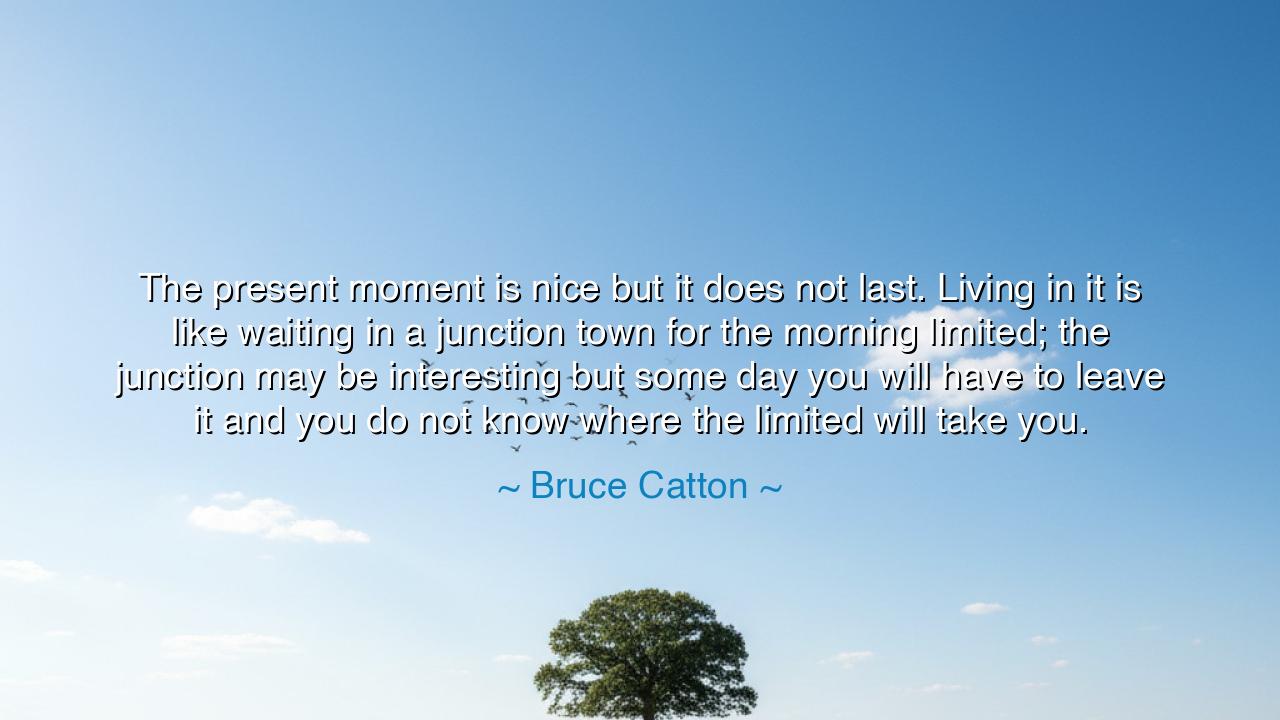
The present moment is nice but it does not last. Living in it is
The present moment is nice but it does not last. Living in it is like waiting in a junction town for the morning limited; the junction may be interesting but some day you will have to leave it and you do not know where the limited will take you.






The words of Bruce Catton strike with the quiet power of wisdom: “The present moment is nice but it does not last. Living in it is like waiting in a junction town for the morning limited; the junction may be interesting but some day you will have to leave it and you do not know where the limited will take you.” At once, he speaks of time, impermanence, and the ceaseless forward march of life. The present is a jewel, but it is not eternal; it is a station, not a destination.
To dwell in the present moment is to enjoy the stillness of the station—the small shops, the curious faces, the passing smells of food and coal. Yet, just as the station is not the end of the journey, so too the moment cannot hold us forever. The train will arrive, and we must climb aboard, carried onward whether with joy or dread. Thus Catton reminds us that life is not meant to be stagnant. To live only in the present, forgetting past and future, is to mistake the waiting room for the voyage itself.
There is a deep humility in this teaching. Catton acknowledges the beauty of the present—it is nice. But beauty is fleeting, and he urges us to recognize the truth that time does not pause. The limited train, swift and unstoppable, represents destiny. We may not know its destination, but we cannot refuse its call. This is the human condition: to savor the moment while preparing to depart, never clinging so tightly that we resist the flow of life.
History echoes this truth. In the days after the American Civil War, which Catton chronicled with reverence, soldiers who had camped together, laughed together, and shared meals at their “junction town” of war found themselves suddenly scattered by peace. Some longed to remain in the brotherhood of arms, but the world moved on. The “train” of time carried them into farms, factories, and politics, whether they wished it or not. The present was beautiful, but it did not last; destiny called them elsewhere.
This wisdom calls us to balance. We must not become so lost in future anxieties that we fail to see the beauty before us. Yet neither must we idolize the present so much that we pretend it can remain unchanged. To do either is folly. The noble path is to embrace the moment as one embraces a guest—grateful for its presence, but willing to let it go when it must depart.
The lesson is clear: do not cling to your junction towns. Do not believe the present, however pleasant, is eternal. Cherish it, yes; learn from it, yes; but prepare always to board the train of change. Life moves forward, whether we are ready or not, and those who resist are dragged, while those who accept are carried with dignity.
Therefore, children of the future, remember this teaching: every present moment is a resting place, not a final home. Wait with patience, live with joy, but keep your eyes open for the train’s arrival. Do not fear where it will take you. For though the path is uncertain, the journey itself is the essence of life. And in this balance—between savoring the now and embracing the unknown—you will find peace, resilience, and wisdom.






AAdministratorAdministrator
Welcome, honored guests. Please leave a comment, we will respond soon